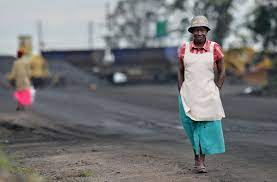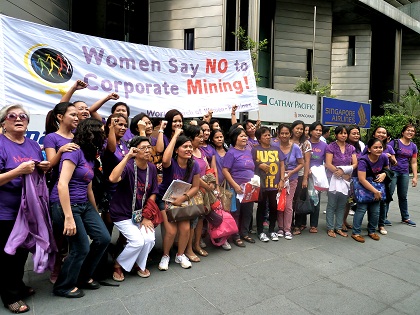
For the past week, women from mining communities in South Africa, Mozambique, Botswana, Zambia and Zimbabwe have been meeting in Johannesburg to share their experiences, strengthen their networks, map and take the way forward. They have been brought together by WoMin, African Women Unite Against Destructive Resource Extraction. They have had enough of environmental devastation, corporate predation, and State violence. They are sick and tired of living and dying in communities and households where everyone is tired, sick, and dying. And they have had enough of being ignored or silenced. They come together to say, Now is the time! They come together to make NOW the time.
In an hour long interview this week, Samantha Hargreaves, Regional Coordinator of WoMin; Nhlanhla Mgomezulu, Coordinator of the Highveld Environment Justice Network; and Susan Chilala, Secretary of the Rural Women’s Assembly, in Zambia, laid out the program. Generally, the women are calling on the State to divert its massive investments in the infrastructure of fossil fuel extraction into alternatives, particularly solar, wind, tidal, and thermal, all plentiful in the Southern African Development Community, SADC, region. All of the countries are already investing great sums of money to make mines happen. The women say: Make something else happen; something sustainable and renewable that will meet the challenge of growing consumption in growing economies.
This diversion would mean that the State would have to reconsider its comfortable relationship with those few who make huge profits at the expense of the many. This would also mean, the women said pointedly, that politicians, such as Cyril Ramaphosa in South Africa, would have to address their complicity as shareholders and leaders in the mineral extractives sector.
The majority of the interview describes the impact of coal mining on local communities. Susan Chilala explained that coal mining attacks women small scale farmers most viciously. She described the impact of coal mining on farming and food security. She talked about the impact on women when their space is taken over by an industry that is so deeply male dominated, from top to bottom.
Nhlanhla Mgomezulu described the impact on women in the South African Highveld: “We women are the ones who suffer most.” Women suffer as individuals, in that their own health is endangered by poisoned water, air, and land, but they suffer even more as principal caregivers of the community. When the children are sick, women work more intensively. When the men return from the mines with asthma, kidney failure, tuberculosis, injuries and more, women are work more intensively. And this labor is `free’ and it’s 30 hours a day, 8 days a week, for life. If that’s not slavery … what is?
Last year, Greeenpeace published a report, which looked at Witbank, in Mpumulanga, in which they found that Witbank has the dirtiest air in the world. This is the gift of coal as a mainstay of `development’: “Sonto Mabina … works at a small tuck shop that’s just a short walk from her home in an informal settlement over the train tracks outside Witbank, in Mpumalanga. She’s lived here for 25 years, arriving well before the three coal washeries that now surround her house … Sonto Mabina, or Katerina as she likes to be called, lives with her husband, Andries. Their house has no electricity or water and Katerina uses a coal stove to cook their suppers, the black plumes of smoke clouding their home. A municipal truck brings water once a week, but most say it’s too polluted to drink. If you can afford to, you buy bottled water in this area of the country; if not, you boil it like Sonto does and you hope for the best. `Dust is my main problem,’ she says. `Every time my child goes to the hospital it’s because of the dust. The doctors say his chest is full of it. The doctors asked me where I lived and I told them. My other child also has problems with his nose because it is always running – the dust affects him too.’ It’s an everyday problem here.”
The women who have gathered in Johannesburg are saying NO to that everyday. They are engaging in a public dialogue, breaking down barriers, transforming isolation into community, teaching as they learn, and they are demanding a better present. Not a better future, a better present. They have lived too long with politicians and others ignoring them. They are demanding that the State take climate change, the environment, community health and wellbeing, and women seriously. African women are standing their ground and more. They are organizing and on the move. The time is now!
(Photo Credit: Mujahid Safodien / Greenpeace)

